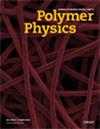内应力分布与PBO纤维结构变化关系的研究
3区 工程技术
Q1 Materials Science
Journal of Polymer Science. Part B, Polymer Physics
Pub Date : 2000-11-15
DOI:10.1002/1099-0488(20001115)38:22<2901::AID-POLB50>3.0.CO;2-#
引用次数: 22
摘要
本文研究了纤维中PBO分子在外力作用下的应力分布。在现实中,不存在具有理想结构的纤维(即由平行于纤维轴的无限长的完整晶体组成,而晶体结构中没有断开应力传递的缺陷)。通常情况下,真实的纤维结构存在一些结构不完整,如分子末端、分子取向错误、密度沿纤维轴波动(不均匀性)等。它们在拉伸变形的纤维中起着非均匀应力分布和降低纤维模量的作用。为了进行这样的分析,我们测量并讨论了PBO纤维在应力作用下的子午x射线衍射峰。特别考虑了衍射峰的分布(衍射峰的半高宽度)。通过测量沿德拜环赤道点的分布,估计了外应力对纤维分子取向的影响。结果表明,三种纤维在外加应力的作用下,子午方向衍射斑的分布变宽,而沿方位角方向衍射斑的分布变窄。对压力的反应程度依次为:AS (180 GPa) > HM (280 GPa) > HM+ (360 GPa)。采用Hosemann的分析方法对实际晶粒尺寸和晶粒无序参数(g)进行分析。结果表明,随着应力的增加,纤维的晶体尺寸没有变化,但晶格中的周期性顺序开始松动。应力似乎只影响晶体结构中的局部微区域。本文章由计算机程序翻译,如有差异,请以英文原文为准。
An investigation into the relationship between internal stress distribution and a change of poly-p-phenylenebenzobisoxazole (PBO) fiber structure
This study concerns stress distribution induced by external force in individual poly-p-phenylenebenzobisoxazole (PBO) molecules in fiber. In reality, there are no fibers having an ideal structure (i.e., composed of infinitely long complete crystal elongated parallel to the fiber axis without defects that disconnect stress transfer in the crystal structure). Normally, real fiber structure has some structural incompletion, such as molecular ends, molecular misorientation, and density fluctuation (inhomogeneity) along the fiber axis. They play the role of heterogeneous stress distribution and reduction of fiber modulus in the fiber under tensile deformation. To carry out such analysis, meridional X-ray diffraction peaks of the PBO fiber under stress were measured and discussed. Distribution of the diffraction peak profile (half-height width of the diffraction profile) was especially considered. Change of the molecular orientation induced by external stress to the fiber was also estimated by measuring distribution of equatorial spots along the Debye ring. It was found that the distribution of the meridional diffraction spots became wider in the meridian, while the peak profile along the azimuthal direction became narrower as external stress was added for all three fibers. The degrees of response against stress came in this order: AS (180 GPa ) > HM (280 GPa) > HM+ (360 GPa). Hosemann's analysis was adopted to analyze real crystallite size and disorder parameter (g) of crystallites. It indicated that the crystalline size does not vary but the ordering of periodicity in the crystal lattice starts to loosen as applied stress to the fiber is increased. The stress seems to affect only local micro regions in the crystal structure.
求助全文
通过发布文献求助,成功后即可免费获取论文全文。
去求助
来源期刊
CiteScore
5.90
自引率
0.00%
发文量
0
审稿时长
2.1 months
期刊介绍:
Since its launch in 1946 by P. M. Doty, H. Mark, and C.C. Price, the Journal of Polymer Science has provided a continuous forum for the dissemination of thoroughly peer-reviewed, fundamental, international research into the preparation and properties of macromolecules.
From January 2020, the Journal of Polymer Science, Part A: Polymer Chemistry and Journal of Polymer Science, Part B: Polymer Physics will be published as one journal, the Journal of Polymer Science. The merged journal will reflect the nature of today''s polymer science research, with physics and chemistry of polymer systems at the heart of the scope.
You can continue looking forward to an exciting mix of comprehensive reviews, visionary insights, high-impact communications, and full papers that represent the rapid multidisciplinary developments in polymer science.
Our editorial team consists of a mix of well-known academic editors and full-time professional editors who ensure fast, professional peer review of your contribution. After publication, our team will work to ensure that your paper receives the recognition it deserves by your peers and the broader scientific community.

 求助内容:
求助内容: 应助结果提醒方式:
应助结果提醒方式:


